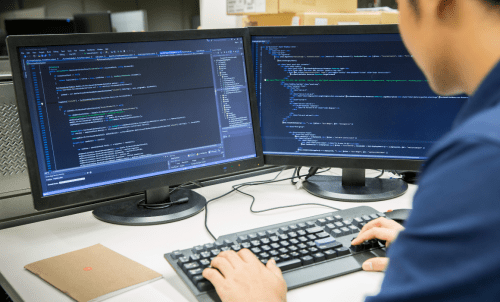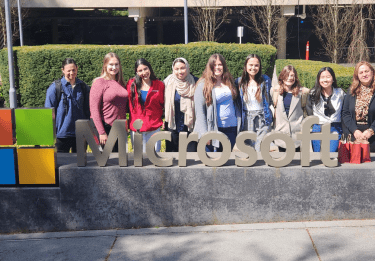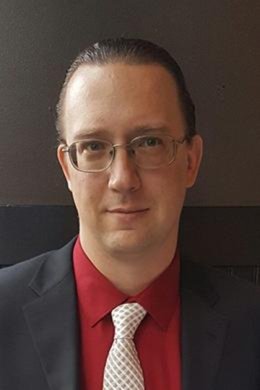
Cybersecurity
The Cybersecurity Program, grounded in Benedictine values, offers a unique blend of technical expertise and ethical training to address the critical need for skilled cybersecurity professionals. This program prepares students to protect data and systems with integrity, meeting the industry's demand for responsible digital guardianship.
Jump to
Why Saint Martin's University?
- Industry-relevant skills: Trains students for in-demand roles like Cybersecurity Analyst and Defensive Operations Technician, addressing the shortage of qualified cybersecurity professionals.
- Learn from industry experts: Instructors bring extensive expertise in cybersecurity, ensuring students gain hands-on experience with cutting-edge technologies, positioning them for successful careers in this critical and rapidly evolving industry.
- Focus on inclusivity and opportunity: Provides a pathway to sustainable, rewarding careers, with special emphasis on supporting first-generation students.
- Values-driven curriculum: Integrates Community Living, Dignity of Work, Justice, and Stewardship into technical learning, ensuring graduates approach cybersecurity with a strong ethical foundation.
Cybersecurity program highlights
- Saint Martin’s Computer Science department Bachelor of Science in Computer Science and Bachelor of Science in Information Technology degrees are ABET accredited. The new Bachelor of Science in Cybersecurity will also be applying for ABET accreditation and Center of Academic Excellence in Cybersecurity (CAE-C) designation once it has been running long enough to be eligible.
- The curriculum is designed to meet the guidelines of the National Centers of Academic Excellence in Cybersecurity (NCAE-C) managed by the NSA's National Cryptologic School. Federal partners include the Cybersecurity and Infrastructure Security Agency (CISA), the Federal Bureau of Investigation (FBI), the National Institute of Standards and Technology (NIST)/National Initiative on Cybersecurity Education (NICE), the National Science Foundation (NSF), the Department of Defense Office of the Chief Information Officer (DoD-CIO), and U.S. Cyber Command (USCYBERCOM).
- CAE-C designation offers major benefits to students enrolled in cybersecurity courses. In addition to providing a robust cybersecurity education, students will be eligible to apply for federal scholarships and will graduate with well-developed cybersecurity knowledge and skills.
- The program ensures every graduate enters the workforce with the following career-enhancing skills: risk assessment, intrusion detection, knowledge of cybersecurity tools (firewalls, antivirus), and ethical hacking.
Why studying Cybersecurity is a smart choice for your future
- There is a huge demand for cybersecurity professionals, as identified by an International Information System Security Certification Consortium (ICS2) 2023 study.
- The Bureau Labor of Statistics reports that for Information Security Analysts role, there were 168,900 jobs in 2022 and the job outlook for 2022-2032 is growing at 32% — much faster than average. The median annual salary for information security analysts was $112,000 in May 2022.
- Saint Martin's Cybersecurity graduates will be well prepared to serve in a variety of roles such as Cybersecurity Analyst, Cybersecurity Defensive Operations Technician, and Security Data Network Technician. A Cybersecurity Analyst protects an organization’s systems and data from cyber threats.
Cybersecurity Requirements
Details on courses, including university core requirements, can be found in the academic catalog.
In addition to the university core requirements, students must also complete:
Foundation courses (12 credit hours)
- CSC 101: Introduction to Computer Science [pre- or co-requisite MTH 100] (3 credits)
- CSC 180: Introduction to Programming [CSC 101] (3 credits)
- CSC 210: Database Fundamentals [pre- or co-requisite CSC 101 or CSC 160] (3 credits)
- CSC 235: Introduction to Linux and Linux Administration (3 credits)
Required math courses (9 or 10 credit hours)
- MTH 161: Mathematical Methods for Business and Social Sciences -OR- MTH 171: Calculus I [MTH 121 or MTH 122] (3/4 credits)
- MTH 200: Math for Computer Science [MTH 161 or MTH 171] (3 credits)
- CSC 201: Statistics for CS with R (3 credits)
Upper division requirements (51 credit hours)
- CSC 325: Computer Security [MTH 101 or MTH 102] (3 credits)
- CSC 333: Auditing IT Infrastructure and Compliance (3 credits)
- CSC 345: Data Communications and Networking [CSC 101 or CSC 160] (3 credits)
- CSC 355: Web Development [CSC 180, CSC 210] (3 credits)
- CSC 363: Ethical Hacking (3 credits)
- CSC 383: Operating System and Application Security [CSC 180, CSC 235] (3 credits)
- CSC 393: Cyber Forensics and Incidence Response (3 credits)
- CSC 423: Network Security [CSC 215 or CSC 345] (3 credits)
- CSC 433: Web Application Security [CSC 355] (3 credits)
- CSC 443: Wireless and Mobile Device Security (3 credits)
- CSC 446: Software Engineering: Analysis & Design [CSC 180, CSC 210] (3 credits)
- CSC 456: Configuring & Developing Cloud Technology (3 credits)
- CSC 481: Senior Project I [CSC 446] (3 credits)
- CSC 482: Senior Project II (CSC 481] (3 credits)
- CSC UD elective (3 credits)
- CSC UD elective (3 credits)
- CSC UD elective (3 credits)
- Ethical Hacking
- Cyber Forensics and Incidence Response
- Network Security
- Wireless and Mobile Device Security
Cybersecurity at a Glance
- Degree
- Bachelor of Science in Cybersecurity
- Program Type
- Major
- Campus
- Main (Lacey)
- Type of Instruction
- In Person
- Online

 Academic Excellence
Academic Excellence
 Outcomes
Outcomes
 Community
Community








